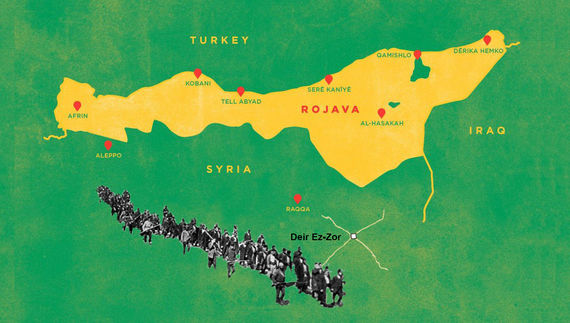Tue Oct 15 2019 · 6 min read
Turkey, the Kurds and the Generational Trauma of the Armenians

By Maria Titizian
Comments
Aline Dedeyan
10/28/2019, 3:41:23 PMAuthors of the excellent article. Every single Armenian wherever he may be knows (end feels) all that you you've been justély writing. Associating it with present-day Turkish political commitments. The present day geopolitical mindsets and actions of the Turkish ruling class. No better than their Ottoman ancestors. We all know. Circulating the same infos among Armenians will not get us any further in the acknowledgement of the denial and recuperation of our legitimate rights. An international trial trial and hammering the "truths" to the entire world via UN and legal institutions and judiciary is what we need. With no fear. Whereas the Armenian diaspora pursues its self-blocked data going round and round in circles- Diplomatic support to Armenian diplomats on the international platforms and forums is the challenge of today. Speak up in parallel at UN and other international fora. Repeating our historical downturns to ourselves does not and cannot go very -New strategies in the face of the whole world - all Armenians united - is paramount.
Richard Ovian Richard
10/24/2019, 10:57:12 AMNice article. Turkey should honor the Treaty of Sevres of 1920. Kurds would have their homeland with those borders.
Fay Dumagat Dumagat
10/23/2019, 5:48:15 AMI sympathize with the Kurds. The Kurdish refugees from Syria should be given by the United Nations a place in Armenia to settle in just like the Jews scatterd in Europe after World War I being assisted by Great Britain and allies to return to Palestine. Turkey should stop attacking the refugees and give some portions of its territory adjacent to Armenia for resettling these refugees. This will start a goodwill signal for amicable relations among the countries involved like Syria, Iraq, and Turkey given the withdrawal of U.S. forces in the area. Russia should play the role of Great Britain in bringing back the "wandering Jews" to Palestine.
Sara Parker
10/18/2019, 3:00:32 AMBeautifully written; you have put into words what I have always thought and felt especially the part about being asked as to why we insist on "holding onto the past"...thank you.
Brian Ellison
10/17/2019, 7:28:29 AMWonderful piece of writing. I truly enjoyed this. Brian
Ardashes GIAGOUPIAN
10/15/2019, 4:57:18 PMcongratulations to Maria for the article.very good "modetsoum".Can I translate it to Greek and of course mention the source and the writer?




EVN Report welcomes comments that contribute to a healthy discussion and spur an informed debate. All comments will be moderated, thereby any post that includes hate speech, profanity or personal attacks will not be published, including abusive, threatening, racist, sexist, offensive, misleading or libelous language. Comments deemed to be spam or solely promotional in nature will not be published. Including a link to relevant content is permitted, but comments should be relevant to the post topic.